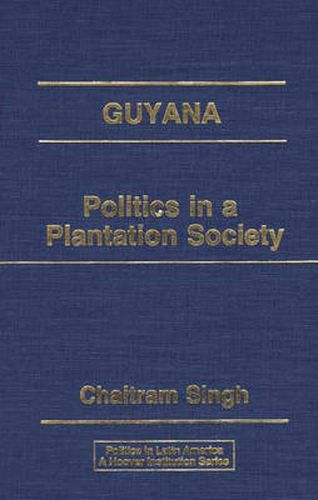Readings Newsletter
Become a Readings Member to make your shopping experience even easier.
Sign in or sign up for free!
You’re not far away from qualifying for FREE standard shipping within Australia
You’ve qualified for FREE standard shipping within Australia
The cart is loading…






This volume examines the politics and government of Guyana from World War II to the present. Professor Singh ably describes the downfall of a nation which, when it became independent in 1966, had good prospects, ample resources, and a relatively educated population. He examines how a liberal democracy succumbed to authoritarian tendencies, resulting in a defacto one-party state. Next, the author demonstrates how economic development became a casualty of over-centralilzed political and economic decision making. He argues that the persistence of underdevelopment in ex-colonies such as Guyana is traceable to domestic causes.
This volume examines the politics and government of Guyana from World War II to the present. Professor Singh ably describes the downfall of a nation which, when it became independent in 1966, had good prospects, ample resources, and a relatively educated population. He examines how a liberal democracy succumbed to authoritarian tendencies, resulting in a defacto one-party state. Next, the author demonstrates how economic development became a casualty of over-centralilzed political and economic decision making. He argues that the persistence of underdevelopment in ex-colonies such as Guyana is traceable to domestic causes.
$9.00 standard shipping within Australia
FREE standard shipping within Australia for orders over $100.00
Express & International shipping calculated at checkout
This volume examines the politics and government of Guyana from World War II to the present. Professor Singh ably describes the downfall of a nation which, when it became independent in 1966, had good prospects, ample resources, and a relatively educated population. He examines how a liberal democracy succumbed to authoritarian tendencies, resulting in a defacto one-party state. Next, the author demonstrates how economic development became a casualty of over-centralilzed political and economic decision making. He argues that the persistence of underdevelopment in ex-colonies such as Guyana is traceable to domestic causes.
This volume examines the politics and government of Guyana from World War II to the present. Professor Singh ably describes the downfall of a nation which, when it became independent in 1966, had good prospects, ample resources, and a relatively educated population. He examines how a liberal democracy succumbed to authoritarian tendencies, resulting in a defacto one-party state. Next, the author demonstrates how economic development became a casualty of over-centralilzed political and economic decision making. He argues that the persistence of underdevelopment in ex-colonies such as Guyana is traceable to domestic causes.